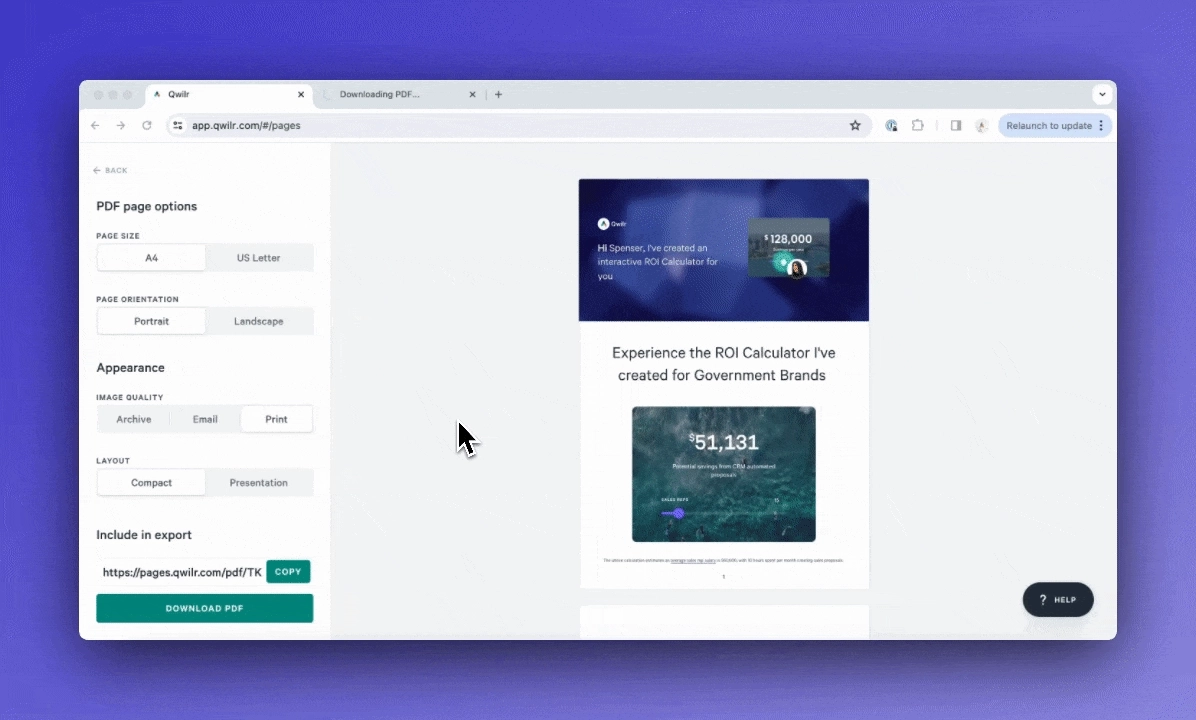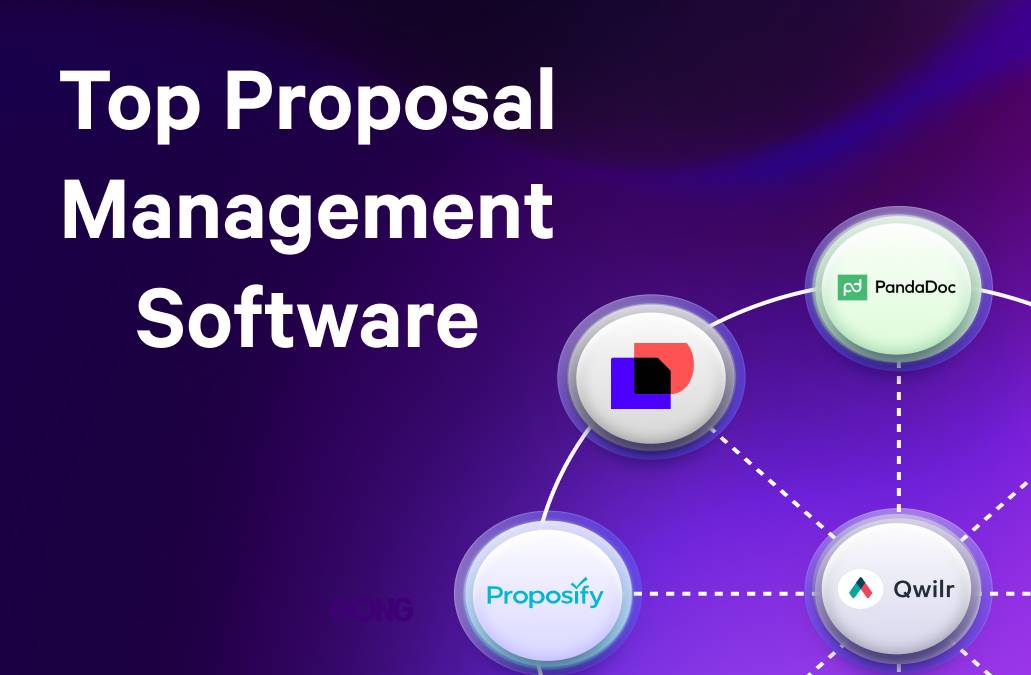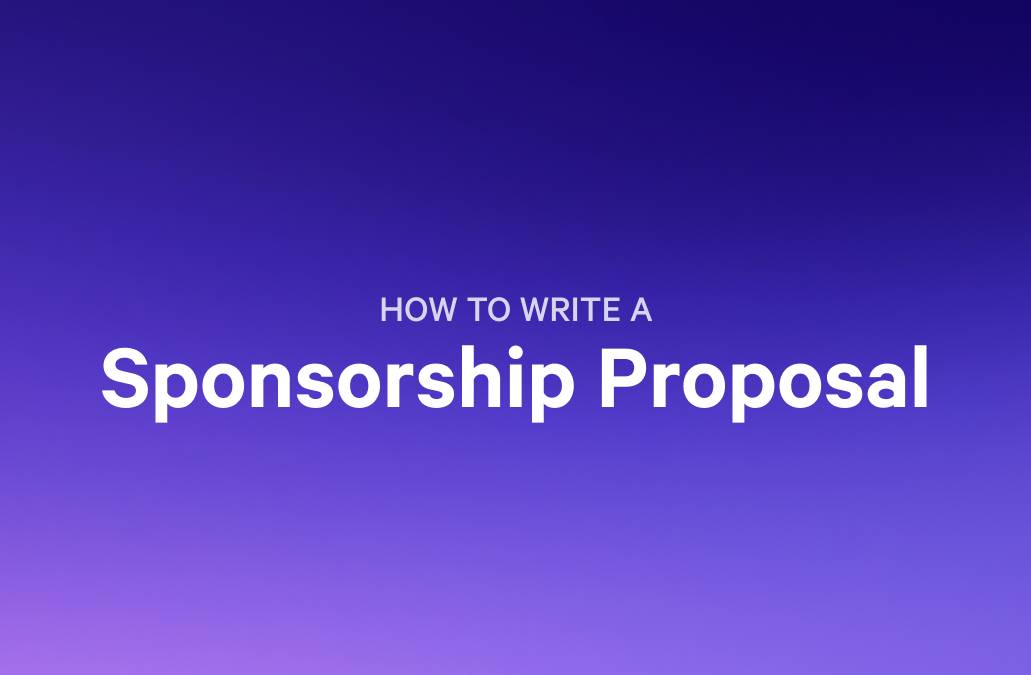With an estimated market value of $2.1 trillion by 2032, the events industry is vast, expanding rapidly - and competitive.
Creating a strong event proposal is essential for any up-and-coming events agency. In an industry where pitching is regarded as essential to win even the smallest contract, you’ve got to be able to stand out from the crowd of companies answering any invitation to tender.
You need to be able to quickly generate clear, comprehensive proposals that answer as many potential questions as possible, letting the buyer visualize the event you’d deliver.
In this article, we’ll explain the purpose of a strong event proposal. We'll also look at the kind of elements you could include to help buyers realize that you’re the best event planning service for their important event.
What is an event planning proposal?
An event planning proposal is a detailed summary that events planners use to communicate their vision of the proposed event to the potential client. It includes a range of information that covers the event objectives, budget, timeline, staffing needs, venue details, and more.
As well as providing both parties with an initial point of reference, a comprehensive event proposal satisfies several other purposes, too.
Persuading the buyer. Your proposal should demonstrate that you’ve clearly understood the brief, as outlined in the invitation to tender (ITT). Any stakeholder reading the events proposal should be able to see at a glance that your vision of the event is perfectly aligned with their needs (known in sales circles as the ‘summary close').
Projecting authority, confidence, and experience. Event planners don’t get a second shot. To consider the event successful, the client needs everything to work out perfectly. A well-constructed proposal can allay their fears and show them they’re working with someone experienced enough to anticipate every possible hindrance and produce the goods.
Attracting sponsors, vendors, and other partners. Your proposal (if successful) can also be used to sell a range of key partners on the benefits of involvement. Sponsors, influencers, key opinion leaders (KOLS), and other partners of the client should understand from the proposal how this event could provide a worthwhile level of visibility and audience engagement potential.
Key elements to include in your event planning proposal
In practice, it’s not always possible to include every detail at the proposal stage. However, the more you can outline, the better - even if some details (e.g., sponsors, vendors) are hypothetical at this stage. These elements can be accounted for within your timeline, with deadlines for securing vendors and other tasks.
Insights from initial client discussions and discovery call
Unless you’re pitching cold, it’s likely that you’ve already started to form a relationship with the client through initial discussions. You may have even gained insights into the proposed event that aren’t detailed in the ITT.
Be sure to follow up on these initial insights and present them as the starting point of the proposal to demonstrate your greater understanding of the client’s needs and to further justify the choices you’ve made in the proposal you’ve created.
Clear objectives and scope
Set the stage for the event. Define the overall purpose, the key goals, and objectives the buyer is looking to achieve. Along with your event description, provide a list of key participants and stakeholders, including the client themselves, the key event manager and personnel from your organization, sponsors, vendors, attendees/guests of honor, and speakers.
Proposed budget
Provide the fullest possible breakdown of costs, itemized to include venue rental, catering, entertainment, marketing, and any other expenses that can be predicted.
Aim to make the budget as realistic as possible, with all costs accounted for, to avoid unexpected expenses and financial difficulties later on. Highlight areas that can be easily adjusted should the client need to revise the budget.
Make sure you factor in seasonal fluctuations when planning ahead, and highlight potential savings (such as early-bird discounts) to provide added value for the buyer.

Use Qwilr’s interactive quote blocks to clearly communicate costs
Detailed timeline
Outline all key tasks and milestones involved in the planning process, including deadlines for securing vendors, sending invitations, and completing other important tasks. Depending on the involvement of different stakeholders and the complexity of the event, it might be useful to provide different personalized timelines that reflect different priorities and responsibilities.
Target audience
Understanding the target audience is crucial for an effective event. Identifying the target audience will shape decision-making about the venue, themes, technologies, and marketing approach. It’s also vital information for third parties such as sponsors, vendors, or influencers looking to ensure that the event provides positive associations for their brand.
Guest management and registration
How will the guest list be managed? Will all guests be treated equally, or will there be special provision for VIPs? How will RSVPs and seating arrangements be handled?
Event technology integration
It’s increasingly important to outline every app, tool, and platform you might use to enhance the event experience. These integrations become even more relevant with the rise of hybrid events - tech-savvy planners can create additional opportunities here by finding innovative ways to augment and improve the remote attendee experience.
Technology can be used to offer tailored content or customized schedules based on attendee preferences, ensuring a more relevant and meaningful experience for each individual.
Online platforms can also be used to streamline logistical processes and reduce the carbon footprint of the event, with digital brochures, e-tickets, and online resources reducing the need for physical processes and materials.
Onsite tech and AV setup
Depending on the client event type and scale of the event, this may be worth outlining as a separate category. Even though there’s some overlap with the event technology requirements, onsite equipment such as projectors, touchscreen interfaces and PA systems are important enough to warrant individual consideration.
Theme and aesthetics
This is one of the most important aspects of your event proposal. Demonstrating a good grasp of the event aesthetics is one of the best ways to show how closely your services can align with the needs of the buyer. The overall aesthetic theme is also going to influence a lot of the other details, such as the choice of venue, entertainment, and catering.
Outline for the buyer as clearly and explicitly as possible, with information about visual elements such as color palette, lighting, room layout, and other environmental factors. Try to provide details about how branding info and sponsorship opportunities will be displayed.
Vendor selection and recommendations
Most professional planning companies have their own roster of vendors for security, entertainment, and catering. However, it’s important to make sure that you choose vendors to match the buyer’s needs as closely as possible rather than shaping the event around your trusted vendors and their availability (in practice, an element of compromise is usually involved here).
Try to present a good range of distinct options for food and entertainment, with key information like menus or performance videos embedded in the proposal.
Venue booking and logistics
Provide a detailed description and images of the chosen venue, along with key logistic information such as permits, accessibility, and parking.
If any part of the event is intended to take place outdoors, provide a full set of bad-weather backup plans, too.
Post-event services
These details are often neglected but represent an excellent way for planners to distinguish themselves further as diligent and responsible providers. Post-event services can include site cleanup, impact reporting, and feedback collection.
Contractual elements
Whether you include this in the body of the proposal or as an attachment, make these necessary points as jargon-free and succinct as possible. Important event policies and procedures here may include:
- Guaranteed minimum attendees
- The validity period for the proposal
- Cancellation stipulations
- Equipment damage or rental clauses
- Payment timelines
- Public liability insurance information
About us
This is the section where you should aim to sell yourself and demonstrate your expertise. Include team member profiles for the personnel who’ll work in direct contact with the buyer. You can also showcase a curated selection of past events you’ve organized, making sure to highlight previous work that mirrors the proposed event you’re bidding for.
For additional social proof, include client testimonials from previous satisfied customers. Include your contact information too, and encourage the buyer to reach out if they need any questions answered.
Signature fields
In any sales process, the seller should aim to reduce the steps required to close the deal. A good proposal software tool like Qwilr provides the buyer with the means to accept the proposal and sign the deal right there in the document.
This saves valuable time and reduces the possibility of your buyer getting cold feet or having their head turned by another proposal.
Using Qwilr also means that multiple buyers can sign the same document, streamlining the process for buying groups or partnerships with multiple stakeholders.

Using Qwilr also means that multiple prospects can sign the same document, streamlining the process for buying groups or partnerships with multiple stakeholders.
Expert tips for writing an event planning proposal
Now that we’ve got the elements down, let’s look at a bunch of helpful tips that will enrich any proposal, taking it to an expert level.
Read next: How to write a conference proposal
Bring the event to life with storytelling
It’s time to get the creative juices flowing. Paint a vivid picture of the event experience you’re proposing: Appeal to the senses by describing what attendees will see, hear, feel, and remember. Seamlessly walk the client through the event flow, highlighting memorable moments and the ambiance created. Remember, keep the story focused on how it aligns with the client’s brand or mission.
Customize your proposal to your client
Make it personal! Build rapport with the client by tailoring the proposal to the client’s specific needs, goals, and values. You could address their pain points and requirements, and mention details that show you understand their brand, industry, and audience. Add the client’s name, logo and brand colors where you see fit.
Highlight your expertise with testimonials and case studies
This is a great opportunity to show off a little. Use case studies to flaunt how you solved specific challenges, exceeded expectations, or achieved measurable outcomes.
Top tip: Select testimonials that reflect the type of event you’re proposing and address similar goals or targets. Include images or brief descriptions of each case study to make it really relatable and to create an emotional connection that conveys excitement and trust. Afterall, clients are looking for a trusted partner.It doesn’t get more convincing than this!
Use visuals and interactive elements to make the proposal appealing
Couple this with the storytelling aspects above, and you’ve got a visually captivating proposal.
High-quality visuals give a clear view of your vision! Use Qwilr’s tools to embed interactive elements, such as images, videos, maps and pricing tables that clients can scroll through. Fashion the design to match your brand's colors, fonts, and style.
Aesthetically designed proposals with modern layouts and visual appeal make a lasting impression and help clients visualize the event’s potential.
Anticipate objections and provide solutions proactively
Better to prevent than to remedy. Thinking ahead means you’ll address any potential concerns upfront - such as budget constraints, timeline issues, or specific event logistics. Acknowledge these concerns and offer savvy solutions, demonstrating your preparedness and flexibility.
For each plausible objection, propose a clear solution or alternative that keeps the event on track without compromising on quality. For instance, if budget is a common concern, offer optional tiers or flexible packages. This is proactivity at its best.
Keep the proposal organized and easy to navigate
If you’ve ever encountered a document that is too busy, or has a stunted flow, you’ll remember that you probably stopped reading it. The key to holding a reader’s attention is really quite simple: Ensure the proposal has a clean, logical flow and is easy to navigate.
Qwlir’s templates have organized, sectioned layouts designed to build credibility and streamline the decision-making process.User-friendly and adaptable, you can drag and drop features as you please, reorder entire sections, and decide not only what you want the reader to see, but how they see it.
Include a clear call to action
You’ve put all the steps in place and have created a beautifully appealing proposal. Now it’s time to conclude with a straightforward call to action (CTA) that invites the client to take the next step.This should be an eye-catching, prominent feature that is hard to miss.
A CTA is crucial for driving user engagement and conversions. With Qwilr’s template, embed a button, banner or text box of your choice. This could prompt the reader to accept the proposal, schedule a meeting or contact you with any questions - whatever it may be, as long as it takes your contract to the next step.
Watch our video for a detailed walkthrough on how to nail your business proposals:
Event proposal templates
An event proposal template is an essential tool for any event planner looking to bid regularly on ITTs. A proposal document also provides the perfect backup to reinforce any points made in a face-to-face pitch meeting. However, it can be challenging (and time consuming) to build one from scratch — but Qwilr has you covered.
Event planning template
Our Event Planning Template provides you with the basics and is instantly customizable to reflect your specific offer or anything you need to help you close the deal.
This template includes sections for:
- Introductions
- Core concept
- Theme and aesthetic vision
- Event design, with a summary of the event’s core components
- Venue details
- Catering and vendor information
- Itemized cost breakdown
- About us, with team profiles
- Video content section
- Contact link
Event services proposal template
Our event services proposal template is crafted to highlight your company's full range of customized event solutions. It presents a professional and clear overview, showcasing your understanding of clients' distinct needs and illustrating how your services create unforgettable, impeccably executed events.
This template includes sections for:
- Introduction
- Objectives
- Investment and pricing models
- Success stories
- Implementation timeline
- Next steps
Event sponsorship proposal template
Engage sponsors and secure funding with our dynamic template. Built for impact and efficiency, this template empowers your team to deliver a persuasive, value-driven sponsorship proposal.
Craft a top-tier proposal that highlights potential exposure, brand synergy, and return on investment for prospective sponsors, ultimately gaining the financial backing your event or organization requires.
This template includes:
- Introduction
- Who attends
- Influence
- Date and events
- Testimonials
- Sponsorship opportunities
- Floor plan
- Get started
Stay competitive - even at your busiest times
Even established events companies, where more than 60% of revenue is generated from existing accounts and relationships, still need to be able to pitch to expand or consolidate existing successes.
It’s imperative that when this need arises, you can call on a customizable planning proposal template you can instantly personalize to the needs of the prospective client. Qwilr provides a cost effective, automated solution for busy event planners to quickly generate personalized proposals in an industry that still depends on pitching for new business.
About the author

Dan Lever|Brand Consultant and Copywriter
Dan Lever is an experienced brand consultant and copywriter. He brings over 7 years experience in marketing and sales development, across a range of industries including B2B SaaS, third sector and higher education.


